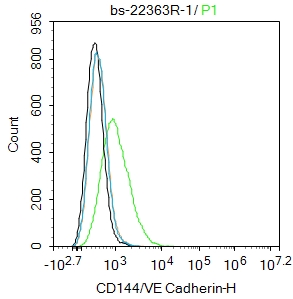VE-Cadherin antibody [GT1369]
GTX633705
ApplicationsImmunoFluorescence, Western Blot, ImmunoCytoChemistry, ImmunoHistoChemistry, ImmunoHistoChemistry Paraffin
Product group Antibodies
ReactivityHuman, Mouse
TargetCDH5
Overview
- SupplierGeneTex
- Product NameVE-Cadherin antibody [GT1369]
- Delivery Days Customer9
- Application Supplier NoteWB: 1:500-1:3000. ICC/IF: 1:100-1:1000. *Optimal dilutions/concentrations should be determined by the researcher.Not tested in other applications.
- ApplicationsImmunoFluorescence, Western Blot, ImmunoCytoChemistry, ImmunoHistoChemistry, ImmunoHistoChemistry Paraffin
- CertificationResearch Use Only
- ClonalityMonoclonal
- Clone IDGT1369
- Concentration1 mg/ml
- ConjugateUnconjugated
- Gene ID1003
- Target nameCDH5
- Target descriptioncadherin 5
- Target synonyms7B4, CD144, cadherin-5, 7B4 antigen, VE-cadherin, cadherin 5, type 2 (vascular endothelium), cadherin 5, type 2, VE-cadherin (vascular epithelium), cd144 antigen, endothelial-specific cadherin, vascular endothelial cadherin
- HostMouse
- IsotypeIgG1
- Protein IDP33151
- Protein NameCadherin-5
- Scientific DescriptionThis gene is a classical cadherin from the cadherin superfamily and is located in a six-cadherin cluster in a region on the long arm of chromosome 16 that is involved in loss of heterozygosity events in breast and prostate cancer. The encoded protein is a calcium-dependent cell-cell adhesion glycoprotein comprised of five extracellular cadherin repeats, a transmembrane region and a highly conserved cytoplasmic tail. Functioning as a classic cadherin by imparting to cells the ability to adhere in a homophilic manner, the protein may play an important role in endothelial cell biology through control of the cohesion and organization of the intercellular junctions. An alternative splice variant has been described but its full length sequence has not been determined. [provided by RefSeq]
- ReactivityHuman, Mouse
- Storage Instruction-20°C or -80°C,2°C to 8°C
- UNSPSC12352203
References
- Liu IF, Lin TC, Wang SC, et al. Long-term administration of Western diet induced metabolic syndrome in mice and causes cardiac microvascular dysfunction, cardiomyocyte mitochondrial damage, and cardiac remodeling involving caveolae and caveolin-1 expression. Biol Direct. 2023,18(1):9. doi: 10.1186/s13062-023-00363-zRead this paper
- Martinez-Sanchez J, Palomo M, Torramade-Moix S, et al. The induction strategies administered in the treatment of multiple myeloma exhibit a deleterious effect on the endothelium. Bone Marrow Transplant. 2020,55(12):2270-2278. doi: 10.1038/s41409-020-0947-9Read this paper
- Sheen YS, Lin MH, Tzeng WC, et al. Purpuric drug eruptions induced by EGFR tyrosine kinase inhibitors are associated with IQGAP1-mediated increase in vascular permeability. J Pathol. 2020,250(4):452-463. doi: 10.1002/path.5393Read this paper
- Kachamakova-Trojanowska N, Stepniewski J, Dulak J. Human iPSCs-Derived Endothelial Cells with Mutation in HNF1A as a Model of Maturity-Onset Diabetes of the Young. Cells. 2019,8(11). doi: 10.3390/cells8111440Read this paper
- Kudo H, Takeichi O, Hatori K, et al. A potential role for the silent information regulator 2 homologue 1 (SIRT1) in periapical periodontitis. Int Endod J. 2018,51(7):747-757. doi: 10.1111/iej.12894Read this paper






![IHC-P analysis of human heart tissue using GTX34239 VE-Cadherin antibody [8E5]. Dilution : 1:200](https://www.genetex.com/upload/website/prouct_img/normal/GTX34239/GTX34239_20200622_IHC-P_310_w_23060801_313.webp)